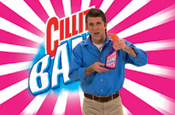Even if Unilever plays it safe and opts for one of its own, this will be no reflection on its rival's business performance. While Reckitt wowed the City last week with its figures - operating profit increased by 22% in the second quarter - Unilever's were underwhelming. The owner of Dove, Vaseline and Hellmann's posted only a 6.8% rise in sales over the same period, achieved largely through price rises.
'Our performance in the first half year has been good in what has been a challenging environment,' argued Cescau. The City begged to differ, and concern over Unilever's flat volume growth sent its share price tumbling.
The companies' fortunes contrast sharply. Cescau, who became Unilever's first group chief executive after its infamous first ever profit warning in 2004, has overseen a painful restructuring programme. The drive, 'One Unilever', aims to cut costs by streamlining the unwieldy country-run businesses into a tighter operation, running ad campaigns and new product development on a global basis.
Unilever has made high-profile disposals to focus resources on its most successful lines. It sold both its European frozen-food business, which included Birds Eye, and the Bertolli olive oil brand.
Reflecting on the restructure, Fernand De Boer, an analyst for investment bank Petercam, says: 'It's going OK internally but the outside world is changing more than Unilever could have expected.' De Boer predicts a gloomy outlook for Unilever, with flat volume growth as consumers shift to cheaper, private-label goods.
Reckitt went through its own organisational changes in the late 90s, after the merger between Reckitt & Colman and Benckiser, having sold the Colman's food business in 1995. As a result, commentators say it has already reached the place where Unilever is striving to be.
'Reckitt is a more focused company that has had fewer evolution problems than Unilever,' says Investec consumer goods analyst Martin Deboo.
A former Unilever executive adds: 'The choice Cescau had was to split food from household and personal care, or drive them together to find synergies. He chose the latter and it has been successful, but what has been more difficult is driving innovation.'
Being innovative has posed no problem for Reckitt, whose business is built on cleaning products, including Cillit Bang and Harpic, and, latterly, over-the-counter medicines, after its £1.9bn acquisition of Boots Healthcare International in 2005. Impressively, 40% of Reckitt's revenue is from products launched in the past three years.
'In household goods it tends to be the newer products that do well,' says Adrian Atterby, industry analyst for household care products at Euromonitor. He adds that Reckitt's portfolio in niche, high-margin household categories such as stain removal - instead of slugging it out with Unilever in detergents - works in its favour too.
Supermarkets are less concerned about entering these categories because of their smaller scale, contends Atterby.
Marketing spend is another factor where Reckitt is outpacing Unilever. Although the latter spends almost twice as much on advertising, Reckitt's UK spend is increasing, while Unilever's is falling.
A spokeswoman for Reckitt says it focuses on 17 'power brands'. 'We're a fast-paced organisation; quick and direct. There are only a couple of layers between the UK marketing director and the chief executive,' she says.
Deboo believes that whoever takes over Unilever must drive Cescau's organisational reforms. He sees no problem with the strategy of keeping its food and household and personal care businesses together and supports its aggressive push into emerging markets.
Reckitt, with its recession-resistant products, so far seems to be weathering the downturn better than Unilever. It will be a brave soul who takes up Cescau's mantle, however, if a full-blown recession does indeed come to pass.


